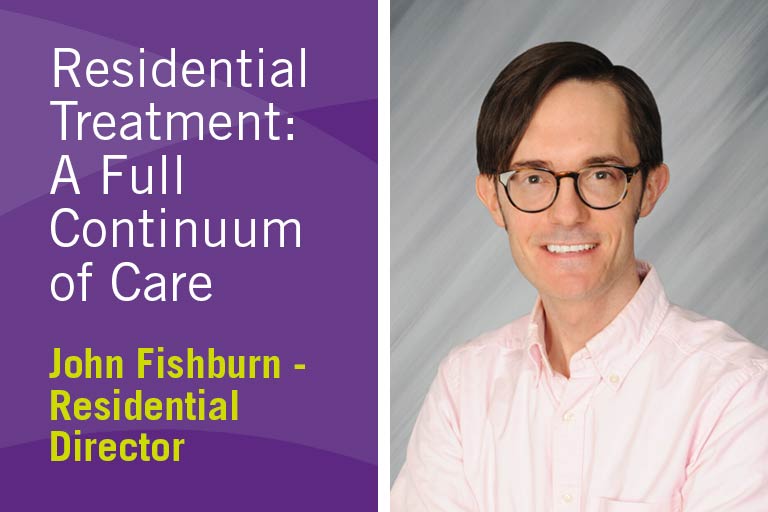Residential Treatment: A Full Continuum of Care

Residential treatment for substance use disorder is an important step in a person’s journey to recovery. OneEighty has two residential treatment facilities: Pathway for men, a Victorian house which was renovated in 2008, and the Women’s Residential Treatment Center (WRTC) which was built in 2019.
“We want people to be healthy and have a life,” offers John Fishburn, OneEighty’s Residential Director. John has been with OneEighty since April, 2018. He started as an Outpatient Counselor, and took over as the Residential Director in March, 2020. “We have a whole team of recovery coaches who help connect with the clients when they’re in detox, who engage with clients when they’re in residential, and then continue to provide support once they’re in outpatient and beyond.”
We treat the whole person.
Residential treatment is for those with substance use disorder who require a more intense level of care. Both programs are staffed 24/7 by professional counselors and Chemical Dependency Counselor Assistants (CDCA’s). Programming includes therapeutic groups twice daily and 12-step group sessions at night. Residential treatment usually lasts around 60 days but varies depending on the client’s needs.
Both programs offer yoga twice a week, and a licensed nutritionist provides programing for the residents. The WRTC facility was able to create a pollinator garden that clients can care for, as well as a raised-bed vegetable garden.
Often, women won’t attend residential treatment because they’re afraid of losing or being away from their children. But at OneEighty, family needs are accommodated: children can stay with their mothers; Pathway also allows for men to have their children if they have custody. “The team works really hard to get kids enrolled in daycare and school, and then they work hard to coordinate transportation. They really go above and beyond,” offers John.
We have a team approach.
“We have a full continuum of care that we’re really blessed to have in a community this size,” says Bobbi Douglas, Executive Director of OneEighty. The residential program can fit patients into the appropriate level of treatment, anywhere from once-a-week outpatient care all the way to high-intensity residential care.
John believes clients need a community of recovery: a counselor, a case manager, a recovery coach, and a sponsor. “You can get all those things while you’re here,” he says. “We have a lot of community support when we take clients to 12-step groups in the community and help connect them with sponsors.”
Many graduates from the residential program come back to support the clients that are going through the same treatment. These Peer Recovery Coaches use their own lived experience with recovery to assist those who are still on their journey. They help remove barriers and obstacles, serving as a personal guide and mentor for those seeking recovery. Many have been certified by Ohio Mental Health and Addiction Services, and like the rest of the clinical staff, OneEighty Recovery Coaches are required to obtain Continuing Education Credits. The residential department also works closely with the outpatient and medical departments in order to help clients transition from daily addiction behaviors to learning to live in recovery.
How to enter residential treatment.
To enter residential treatment, clients must meet criteria. This includes having an active addiction issue, as well as being free from medical or psychiatric conditions that would be too severe for our staff to treat. All potential clients are screened by our admission team. Anyone can request a screening by calling: 330-804-5850 to reach our admissions hotline. Admission inquiries can also be emailed to: admissions@one-eighty.org. For the best recommendations, a full assessment is requested to be conducted by a licensed clinician at our main office. This can be scheduled at 330-264-8498.
Life after residential care.
The journey to recovery doesn’t end with residential treatment. “You come through our program, and you can be with us for a long time,” says John. In 2021, OneEighty began to offer Transitional Recovery Housing. This program is for clients coming out of residential treatment who may still need ongoing support and may also need assistance with employment and finding permanent housing.
Of Transitional Recovery Housing, John says, “Most of our clients coming into residential treatment have dealt with catastrophe and trauma. Some really don’t have a safe place to go afterwards. They’re really working hard to establish their recovery. We designed this program as a step-down treatment program.”
OneEighty also has a recovery club where former residents can learn to socialize while being clean and sober. They can help take clients to 12-step groups and connect them with sponsors.
“We don’t believe anything important happens quickly,” says John. “We need to make sure that the clients are prepared to put in the hard work. We help people get back on their journey.”
If you have any questions, you can call our main office at 330-264-8498 and ask about residential treatment or send an email to: admissions@one-eighty.org. For more information, check out our Residential Program FAQ.
